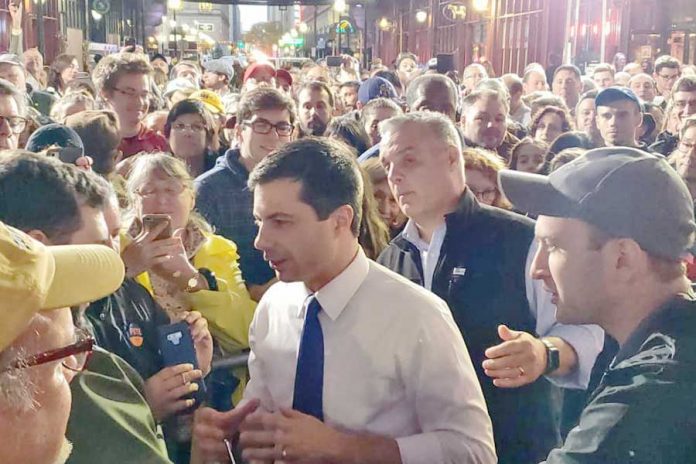To chants of “President Pete,” Mayor Pete Buttigieg gave a rousing speech at midnight after the Iowa caucus was long-finished. When he spoke, no results were in due to a complication with tabulations from the Iowa Democratic Party, but internal polling led Buttigieg to trust he had won. As of Wednesday, with 85 percent of the votes counted, Buttigieg remained in first place with 26.7 percent of the vote and 11 pledged delegates. Bernie Sanders is in second place with 24.4 percent, with Elizabeth Warren and Joe Biden following.
Nathan Osburn, head of Philly for Pete, was exhilarated by the result. “Pete’s volunteers and supporters, including many from Philly who phone banked or actually went to Iowa, made history for the first major LGBTQ candidate for president. We are thrilled about that, and we’re moving on to New Hampshire.”
Buttigieg drew on a broad coalition of progressives and moderates in cities, suburbs and small towns. He is currently winning 60 of the state’s 99 counties, while Sanders has 18, Biden has 7, and the remainder are divided between third-place finisher Elizabeth Warren and fifth place Amy Klobuchar. The broad base of support Buttigieg garnered was significant. Sanders’ base of support was college towns and urban areas.
Political pundits have already begun to make the case for Buttigieg, not Biden, as the candidate who can beat Sanders and also take down Trump. In Iowa, Buttigieg won among the 40 percent of caucusgoers self-defined as “somewhat liberal” and he tied Biden for the lead with “moderates.”
Buttigieg was the first choice among women and second among men. He was the first choice among caucusgoers aged 45 to 64 and second choice among those aged 30 to 44, as well as among those aged 17 to 29, who split for the first choice between Warren and Sanders. Buttigieg was first among caucusgoers who had college degrees and second among those without college degrees.
Buttigieg impressed caucusgoers on issues. On the majority of ballots, which have two votes each — first and second choice — Buttitgieg was either the first or second candidate. He tied for the lead with Sanders on healthcare, the top concern among caucusgoers and Sanders’ signature issue. He came in second to Biden on foreign policy despite being 40 years younger. Caucusgoers also said in interviews that Buttigieg’s military service and knowledge of world politics made him a good choice on foreign policy.
Buttigieg won 24 percent to Biden’s 23 percent on electability. While Sanders got 31 percent of first-time caucusgoers, Buttigieg was second with 25 percent.
Buttigieg campaigned in Iowa for Barack Obama in 2008 and is a native of nearby Indiana. Sanders came in a very close second to Hillary Clinton in 2016, but lost more than half of caucusgoers this time to Warren and Buttigieg. Sanders had campaigned on generating far more votes in 2020 than in 2016, but voting was down from last time.
Osburn said that Philly for Pete was looking ahead, “Our focus locally right now is getting signatures for our delegates to help them run alongside Pete on the April 28 Pennsylvania ballot,” he said..
